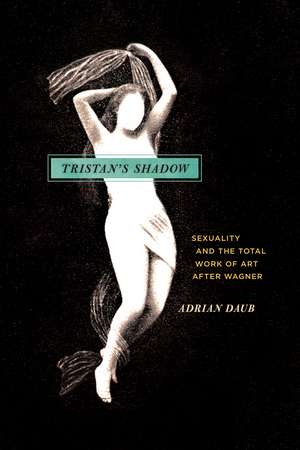Tristan's Shadow: Sexuality and the Total Work of Art after Wagner
Autor Adrian Dauben Limba Engleză Hardback – 25 noi 2013
Das Rheingold, Die Walküre, and Siegfried. Parsifal. Tristan und Isolde. Both revered and reviled, Richard Wagner conceived some of the nineteenth century’s most influential operas—and created some of the most indelible characters ever to grace the stage. But over the course of his polarizing career, Wagner also composed volumes of essays and pamphlets, some on topics seemingly quite distant from the opera house. His influential concept of Gesamtkunstwerk—the “total work of art”—famously and controversially offered a way to unify the different media of an opera into a coherent whole. Less well known, however, are Wagner’s strange theories on sexuality—like his ideas about erotic acoustics and the metaphysics of sexual difference.
Drawing on the discourses of psychoanalysis, evolutionary biology, and other emerging fields of study that informed Wagner’s thinking, Adrian Daub traces the dual influence of Gesamtkunstwerk and eroticism from their classic expressions in Tristan und Isolde into the work of the generation of composers that followed, including Zemlinsky, d’Albert, Schreker, and Strauss. For decades after Wagner’s death, Daub writes, these composers continued to grapple with his ideas and with his overwhelming legacy, trying in vain to write their way out from Tristan’s shadow.
Drawing on the discourses of psychoanalysis, evolutionary biology, and other emerging fields of study that informed Wagner’s thinking, Adrian Daub traces the dual influence of Gesamtkunstwerk and eroticism from their classic expressions in Tristan und Isolde into the work of the generation of composers that followed, including Zemlinsky, d’Albert, Schreker, and Strauss. For decades after Wagner’s death, Daub writes, these composers continued to grapple with his ideas and with his overwhelming legacy, trying in vain to write their way out from Tristan’s shadow.
Preț: 280.11 lei
Preț vechi: 326.84 lei
-14% Nou
Puncte Express: 420
Preț estimativ în valută:
53.61€ • 55.38$ • 44.61£
53.61€ • 55.38$ • 44.61£
Carte indisponibilă temporar
Doresc să fiu notificat când acest titlu va fi disponibil:
Se trimite...
Preluare comenzi: 021 569.72.76
Specificații
ISBN-13: 9780226082134
ISBN-10: 022608213X
Pagini: 240
Dimensiuni: 152 x 229 x 20 mm
Greutate: 0.48 kg
Ediția:New.
Editura: University of Chicago Press
Colecția University of Chicago Press
ISBN-10: 022608213X
Pagini: 240
Dimensiuni: 152 x 229 x 20 mm
Greutate: 0.48 kg
Ediția:New.
Editura: University of Chicago Press
Colecția University of Chicago Press
Notă biografică
Adrian Daub is associate professor of German Studies at Stanford University. He is the author of Uncivil Unions: The Metaphysics of Marriage in German Idealismand Romanticism and of Four-Handed Monsters: Four-Hand Piano Playing and the Making of Nineteenth Century Domestic Culture. He lives in San Francisco.
Cuprins
Acknowledgments
Introduction · Tristan’s Shadow: The Fate of Sexual Difference in Opera
1 · Mother Mime: Wagner and the Metaphysics of Sexual Difference
2 · Mime’s Revenge: The Total Work of Art and the Ugly Detail
3 · Taceat Mulier in Theatro: Richard Strauss’s Guntram, Arthur Schopenhauer, and the Exorcism of the Voice
4 · Erotic Acoustics: The Natural History of the Theater and Der ferne Klang
5 · Congenital Blindness: Visions of Marriage in the Operas of Eugen d’Albert
6 · Occult Legacies: Eroticism and the Dynasty in Siegfried Wagner’s Operas
7 · The Power of the “Verfluchte Lohe”: (Post-)Wagnerian Redheads in Das Rheingold, Fredegundis, and Irrelohe
Coda · “I’m a Stranger Here Myself ”
Notes
Index
Introduction · Tristan’s Shadow: The Fate of Sexual Difference in Opera
1 · Mother Mime: Wagner and the Metaphysics of Sexual Difference
2 · Mime’s Revenge: The Total Work of Art and the Ugly Detail
3 · Taceat Mulier in Theatro: Richard Strauss’s Guntram, Arthur Schopenhauer, and the Exorcism of the Voice
4 · Erotic Acoustics: The Natural History of the Theater and Der ferne Klang
5 · Congenital Blindness: Visions of Marriage in the Operas of Eugen d’Albert
6 · Occult Legacies: Eroticism and the Dynasty in Siegfried Wagner’s Operas
7 · The Power of the “Verfluchte Lohe”: (Post-)Wagnerian Redheads in Das Rheingold, Fredegundis, and Irrelohe
Coda · “I’m a Stranger Here Myself ”
Notes
Index
Recenzii
“Tristan’s Shadow is an important, highly intelligent, and ambitious study. Rigorously researched, blissfully unencumbered by canonical narratives, and written with Adrian Daub’s signature verve, this book provides a new, and entirely compelling, account of German opera after Wagner. It will undoubtedly become standard reading in musicology and opera studies, in German studies and comparative literature, and in the history of sexuality.”
“Boldly taking Wagnerism far beyond the usual suspects, Adrian Daub shows that the influence of Tristan didn't end with chromaticism or even with metaphysics. In a brilliant flash of insight, Daub perceives that the opera’s eroticism is entwined with its dramatic aesthetics in ways that haunted and inspired later composers. Better than any recent book I can think of, this lucid and imaginative study shows why Wagner mattered—and continues to matter—enormously.”
“In Tristan’s Shadow Adrian Daub does nothing less than rethink from the ground up the problem that Wagner's legacy posed for German opera composers through the first half of the twentieth century. Wagner himself emerges in a fresh light as Daub uncovers the surprisingly close connections between the erotics of Wagnerian opera and the idea of the Gesamtkunstwerk. The mixture, both intoxicating and toxic, sets goals for subsequent German opera that, as Daub shows in a series of richly textured readings, could neither be achieved nor evaded. Anyone still struggling with Wagner (and who, in the opera world, is not?) will find this book rewarding.”
“Tristan’s Shadow maps sexuality onto Wagner’s concept of the total work of art, in order to show how the Gesamtkunstwerk must take account of the body and the sexual. Through exciting readings of Strauss, Schreker, d’Albert and Siegfried Wagner and Kurt Weill, Adrian Daub shows opera to be attuned to—and discordant with—ugliness, sexual dissidence, crises of masculinity and decadence: he reads German post-Wagnerian opera as though it was an index to the cultural crises that produced Hitler’s Reich.”
